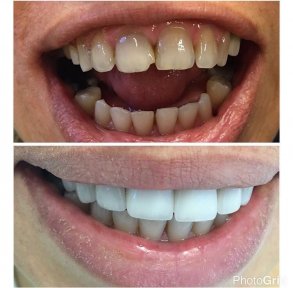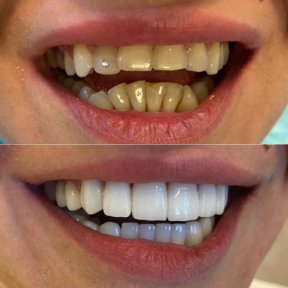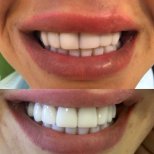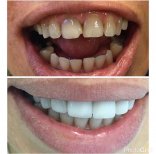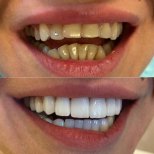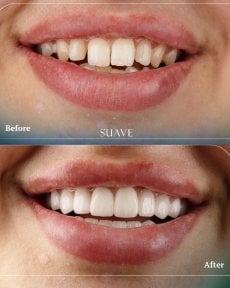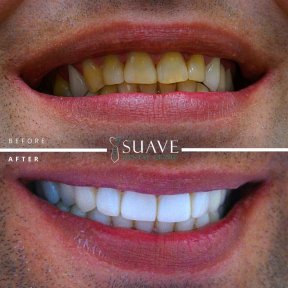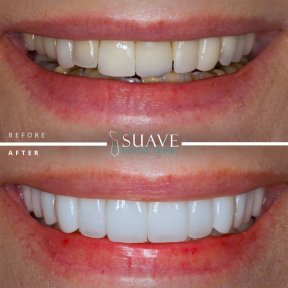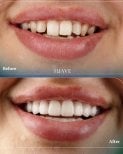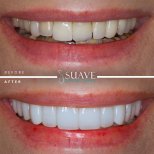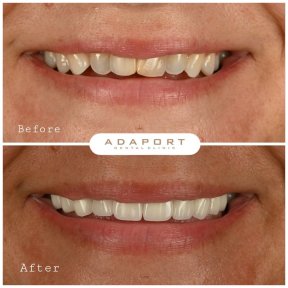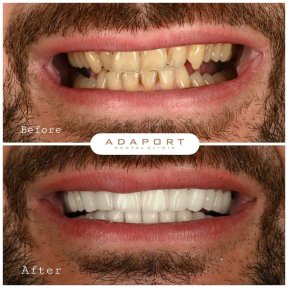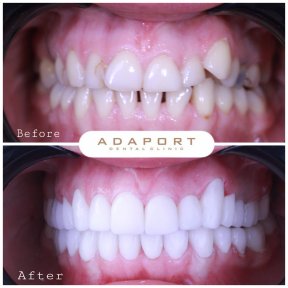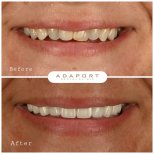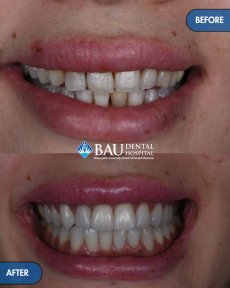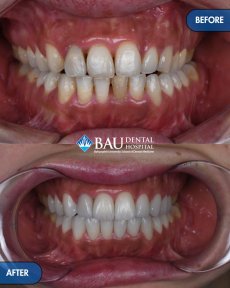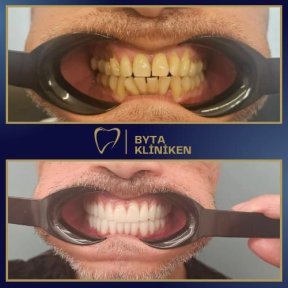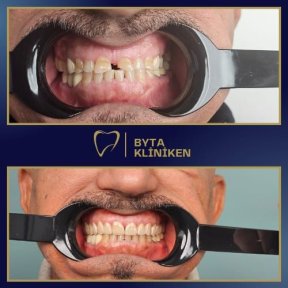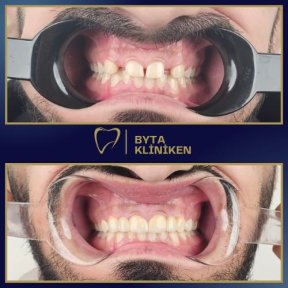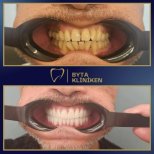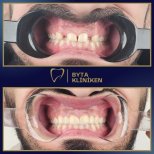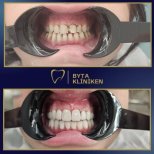This package provides 8 premium EMAX laminate veneers for a natural aesthetic. Dr. Aylin Turan, with over 1,100 veneer treatments, performs this one-day procedure at the 4.8-star rated Istanbul Aesthetic Plastic Surgery Center. For approximately $3,050, it includes post-op medication, blood tests, and a 6-day 4-star hotel stay with transfers. The clinic, trusted by over 4,000 patients annually, has a 97% client recommendation rate.
What Are Dental Veneers?
Dental veneers are thin shells placed on the front of teeth to improve the look of teeth. They are the cheapest way to get perfect teeth.
Is the dental veneer procedure for you?
Most likely if you struggle with one or more issues listed below.
-
Discolored teeth that don't respond to whitening.
-
Chipped or broken teeth.
-
Gaps between teeth.
-
Uneven or misshapen teeth.
-
Minor misalignment issues.
Techniques and Variations of Veneers
Traditional veneers require slight enamel removal for a perfect fit, as seen with porcelain and Emax options. Newer techniques like laser and ultrasound improve comfort and healing.
In recent years, AI and digital tools have become a big part of dentistry, helping make procedures like veneer placement more precise and efficient.
For a no-prep, reversible option, Lumineers need little to no enamel removal.
There are several types of veneers, each offering different benefits.
| Veneer type | Features | Best for |
|---|---|---|
| Porcelain veneers | Stain-resistant, durable, natural-looking. | Patients wanting long-lasting, high-quality results. |
| Emax veneers (porcelain) | Ultra-thin, strong, high translucency. |
Best option in Turkey for a natural smile. |
| Lumineers (porcelain) | No enamel removal, thinner than standard porcelain. | Those wanting a reversible, minimally invasive option. |
| Composite veneers | More affordable, quick to apply. | A budget-friendly option with a slightly shorter lifespan. |
Comparison of Veneers with Other Cosmetic Procedures
Getting veneer cosmetic dental procedures in Turkey is a long-term investment in a perfect smile, offering a natural look. However, some patients may find alternative treatments more suitable depending on their needs.
While this treatment can improve appearance, it cannot replace the restorative functions that a dental implant provides, as the procedure is purely cosmetic.
| Procedure | Invasiveness | Effect | Recovery time | Best for |
|---|---|---|---|---|
| Veneers | Moderate (some enamel removal) | Covers discoloration, chips, gaps, and irregular shapes. | 1–2 weeks | Instant smile transformation with long-lasting results. |
| Crowns | High (significant enamel removal) | Restores damaged teeth entirely. | 1–2 weeks | Teeth with severe damage or decay. |
| Teeth whitening | None (non-invasive) | Brightens tooth color only. | Mild to moderate | Mild to moderate discoloration. |
| Braces/Aligners | High (months/years of treatment) | Straightens teeth permanently. | Several months to years | Correcting misalignment and bite issues. |
| Bonding | Low (minimal enamel shaping) | Fixes minor chips and gaps but stains over time. | Immediate | Quick, budget-friendly fix for small imperfections. |
Who Is a Candidate for Veneers in Turkey?
Here's who makes a good candidate for the procedure.
Best for:
-
Patients with discolored, chipped, or misaligned teeth.
-
Those wanting a durable, aesthetic smile makeover.
-
People with healthy gums and no active infections.
Not for:
-
Patients with severe tooth decay or gum disease.
-
Those who grind their teeth excessively (unless using a night guard).
-
People looking for a fully reversible treatment.
-
Individuals with severe enamel loss or weak teeth.
-
Patients under 18 years old, unless recommended by a dentist.
How Are Veneers Applied?
The veneer application process follows precise clinical protocols established through extensive research. Tooth preparation involves removing approximately 0.5mm of enamel (the standard minimal thickness recommended by clinical studies) to ensure proper veneer fit and bonding strength. This precise measurement preserves maximum tooth structure while allowing adequate space for the restoration.
| Step | What Happens? |
|---|---|
| Consultation | Digital smile design and treatment plan. |
| Tooth preparation | Minimal enamel shaving for proper veneer fit. |
| Impressions | A mold is taken to craft custom veneers. |
| Temporary veneers | Worn while permanent veneers are being made. |
| Fitting & bonding | Permanent veneers are cemented onto the teeth. |
The treatment takes 5–7 days to complete.
For those who are considering this treatment in Turkey, blood tests are not required. But some dental tourism clinics may ask for basic tests for patients with bleeding disorders, diabetes or other medical conditions that can affect healing.
Recovery and Rehabilitation
Healing after getting the procedure is usually smooth, but proper care is key. Recovery follows a predictable timeline based on clinical studies: most patients experience initial sensitivity for 1–2 weeks, with full adjustment occurring within 2–3 weeks. Clinical research shows that 99.7% of patients achieve successful adaptation at 1 year, with 97.9% maintaining success at the 4-year mark.
Recovery timeline:
-
First 48 hours – Mild sensitivity, adjust to new bite.
-
First week – Avoid hard or sticky foods.
-
1–2 weeks – Gums heal, final adjustments if needed.
Best post-care tips:
-
Use a soft-bristled toothbrush.
-
Avoid staining foods like coffee and wine.
-
Follow up with your cosmetic dentist at Turkish dental clinics.
Risks and Possible Complications
Dental veneers have excellent long-term outcomes, with survival rates exceeding 90% for more than 10 years according to comprehensive clinical studies. However, patients should understand specific risks to make informed decisions.
Common side effects:
-
Temporary tooth sensitivity (occurs in approximately 20% of patients)
-
Gum irritation
-
Minor speech adjustments
Fracture remains the primary failure mechanism when complications occur, followed by debonding and color change.
Rare complications:
-
Chipping or detachment of the restoration
-
Poor fit requiring replacements
-
Postoperative pulpitis (affects approximately 2.1% of cases)
Minimize risks by choosing a reputable clinic with positive reviews.
Results of the Veneer Cosmetic Dental Treatment
Instant transformation – You'll see your new smile as soon as the treatment is placed. Minor adjustments may be needed for bite and comfort.
It takes 1–2 weeks for your restoration to settle as you get used to them. Any discomfort or sensitivity will fade during this period.
Patient satisfaction
Patient satisfaction with dental veneers is consistently high across clinical studies. Research shows satisfaction rates ranging from 80–100%, with some studies reporting increased satisfaction over time as patients become accustomed to their improved aesthetics.
A patient from Spain who received treatment at Istanbul Aesthetic Plastic Surgery Center shared: "My experience is unbeatable, I will recommend it to everyone, very happy with Bookimed and with the result. My doctor was sensational, professional." (Bookimed verified review)
A UK patient reported: "The results are incredible, no more gap and my teeth are so much whiter. The entire team were absolutely amazing, they made me feel absolutely at ease." (Bookimed verified review)
How long do Turkey veneers last?
| Veneer type | Lifespan |
|---|---|
| Porcelain veneers | 10–15 years |
| Emax veneers | 10–15 years |
| Lumineers | 10–15 years |
| Composite veneers | 5–7 years |
Proper care and regular dental check-ups help extend their longevity.
Second correction needed?
-
Most local and international patients don't need a second procedure if the restoration is fitted properly.
-
Minor touch ups may be needed if the treatment chips, wears out or needs reshaping over time.
-
Regular dental check-ups will ensure that the best option in Turkey stays in good condition.
Is Turkey Good for Getting Veneers?
Yes, and here's why:
- Expert dentists – Turkey has 425 clinics offering veneer procedures, with over 1 million requests served through Bookimed alone, including top-rated facilities such as WestDent Clinic (4.8/5, İzmir), Istanbul Aesthetic Plastic Surgery Center (4.7/5, Istanbul), and YEG Clinic (4.6/5, Istanbul), all verified through quality assessments. Experienced specialists include Dr. Susana Akdash (cosmetic dentist at WestDent Clinic, İzmir) and Dr. Imad Alboshe (orthodontics, periodontics, and endodontics specialist at SUAVE DENTAL CLINIC).
The purpose of the Turkish Dental Association (Türk Dişhekimleri Birliği) is to promote high standards, support professional dental development, and advocate for public oral health in Turkey.
- Advanced technology – Clinics use Emax smile makeover packages and digital smile design for precise results.
- Accredited clinics – Turkish dental facilities hold international certifications. For example, WestDent Clinic (4.8/5) maintains a ISO certification, ensuring high-quality care standards.
- Huge savings – The cost of the procedure in Turkey is 60–70% cheaper than in the UK or USA.
- All-inclusive packages – Most Turkey package deals cover hotel stays, VIP transfers, and post-op care.
A patient from the UK treated at Hospitadent Dental Group - Antalya Clinic reported: "The staff are polite, attentive. They try to make the right decision about your treatment. Thank you for new beautiful teeth." (Bookimed verified review)
A British patient at SUAVE DENTAL CLINIC noted: "Dr.Emad knew what he was doing the whole time, he delivered natural smile as promised that suits my face and the rest of my teeth. Everyone in the clinic was very helpful." (Bookimed verified review)
Turkey teeth treatments are known for their affordability and quality, making Turkey a leading destination for dental tourism. Turkey's dental tourism market is growing fast, with $802.7 billion invested in research and development—a 42.8% increase.
Preparing for a Trip to Turkey for Veneers
Planning ensures a smooth experience. Here's what you need to know before arriving at the Turkish clinic for a dental veneer procedure or other dental treatments:
Visa and stay
-
Many nationalities, including the UK, EU, and USA, can enter visa-free or apply for an e-visa online before traveling.
-
Patients usually stay 5–7 days enough time for consultation, preparation, veneer placement, and follow-up at a Turkey dental center.
Payments and currency
-
Clinics accept cash, credit/debit cards and bank transfers.
-
Payments are usually made in Turkish Lira (TRY), Euros (€), or USD ($). Some clinics may offer installments.
Turkey holiday package
Clinics offer all-inclusive packages that cover:
-
4- or 5-star hotel accommodation
-
Airport-hotel-clinic transfers
-
Consultation and follow up care
A regular Turkey holiday package also includes sightseeing so you can combine cosmetic dentistry abroad with a holiday.
Before traveling, confirm your clinic's payment policies, stay requirements, and available packages.
How Much Do Veneers Cost in Turkey?
The cost of the procedure in Turkey is significantly lower than in the UK, USA, and Europe, making it one of the cheapest places for dental work. Patients can save up to 70%. Treatment cost varies depending on the type chosen, with porcelain options often being more expensive.
Dental clinics in Turkey offer package deals and discounts for multiple treatments, which can further reduce the overall cost.
What is the average price in Turkey?
On average, veneer prices in Turkey range from $350–650 per tooth according to Bookimed data, while in the USA, the cost is $1,000 to $2,500 (£800 to £2,000) per tooth.
The final cost depends on the type chosen:
-
Porcelain options in Turkey – $150–$350 per tooth
-
Emax treatment in Turkey price – $180–$400 per tooth
-
Composite options in Turkey – $100–$250 per tooth
Compared to other dental treatments, such as dental implants, this procedure can be a more affordable option for enhancing your smile.
Why Are Teeth Veneers Cheaper in Turkey?
Turkey is the cheapest country for this treatment due to:
- Lower clinic operational costs – Affordable rents and medical expenses.
- Favorable exchange rates – Your money stretches further.
- High patient volume – Competitive cost abroad due to medical tourism demand.
Transparent pricing with Bookimed: Patients pay directly at the clinic, ensuring official price lists with no hidden fees.
References
- Alothman Y., Bamasoud M. S. The Success of Dental Veneers According To Preparation Design and Material Type. Open Access Macedonian Journal of Medical Sciences. 2018. Vol. 6, no. 12. P. 2402–2408. URL: https://pmc.ncbi.nlm.nih.gov/articles/PMC6311473/ (date of access: 13.11.2025).
- Comprehensive Report Reviews the Role of Nanotechnology in Dental Veneer Development: Key Trend in The Dental Veneers Global Market 2025-2034. WhaTech. URL: https://www.whatech.com/og/markets-research/medical/936644-the-role-of-nanotechnology-in-dental-veneer-development-key-trend-in-the-dental-veneers-global-market-2025-2034.html (date of access: 13.11.2025).
- Turkey Dental Tourism Market Competition Forecast and Opportunities, 2028. Market Research Reports and Industry Analysis. URL: http://www.asdreports.com/market-research-report-624709/turkey-dental-tourism-market-competition-forecast-opportunities (date of access: 13.11.2025).

